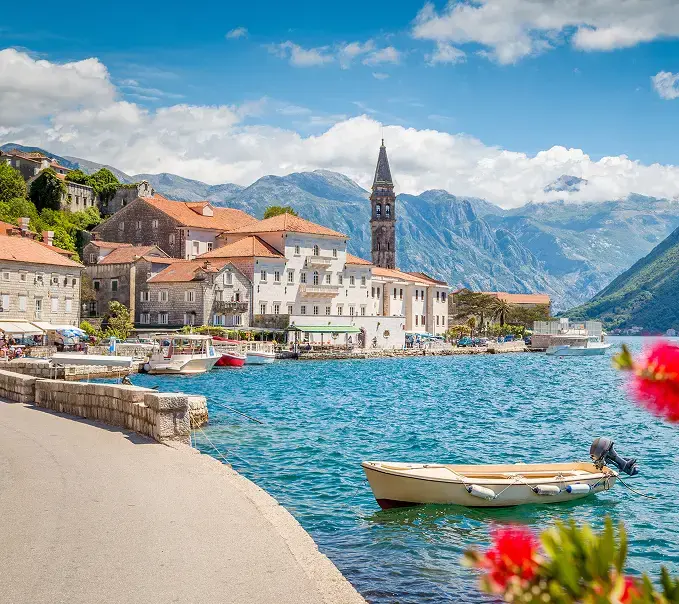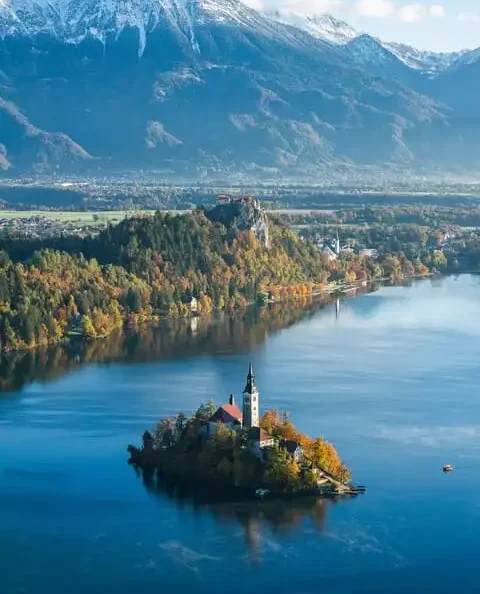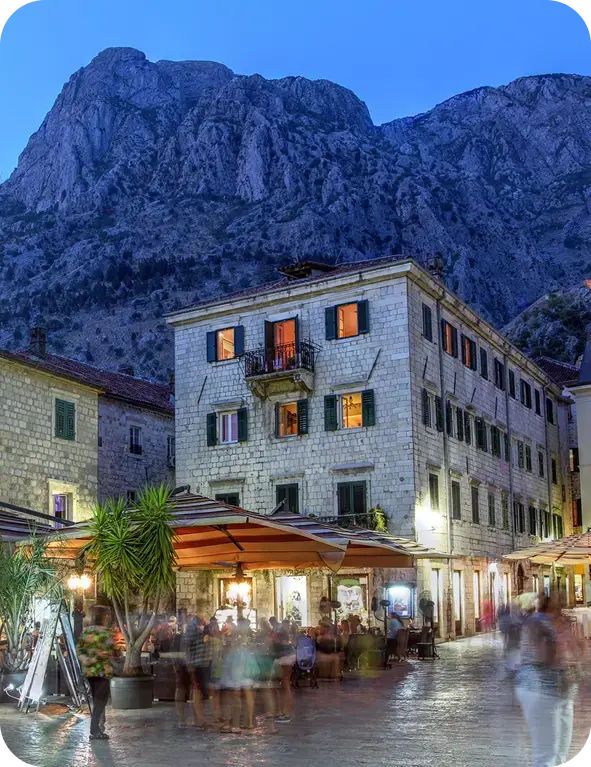Population
GDP (per capital)
Visa-Free Countries
GDP (purchasing power parity)
-
Immigration to Montenegro
-
Strategically located in the heart of the Balkans, Montenegro has become an increasingly attractive destination for expatriates in 2025. Bordered by five countries and boasting a spectacular Adriatic coastline, it offers a compelling mix of natural beauty, cultural heritage, and geopolitical relevance. From the towering mountains of Durmitor to the serene bays of Kotor, its landscapes are both diverse and enchanting. Coupled with a low cost of living, a mild climate, and continued progress toward EU integration, Montenegro is drawing growing interest from digital nomads, investors, and those seeking a peaceful yet connected lifestyle in Europe.
- Main Industries
- Tourism and Hospitality
- Agriculture and Farming
- Aluminum and Metal Production
- Energy and Hydropower
- Forestry and Wood Processing
- Construction and Real Estate
- Fishing and Aquaculture

UTC+1
13,812 km2
Euro
Podgorica
Montenegrin (official)
Serbian, Albanian, Croatian, Bosnian

-
Temporary Residence Permits
-
Obtaining a temporary residence permit is an essential step for anyone planning to reside in Montenegro beyond the standard tourist stay. As of 2025, the process has become more accessible and inclusive, reflecting the country's growing popularity among expatriates, remote professionals, and international investors.
-
What is a Temporary Residence Permit?
- A legal authorization that allows non-citizens to stay in Montenegro for more than 90 days.
- It is required for individuals who intend to live, work, study, or invest in the country on a longer-term basis.
-
Validity and Renewal
- Typically issued for one year, with the possibility of annual renewal.
- The permit must be renewed before it expires, and the holder must continue to meet the eligibility requirements.
- After five years of uninterrupted legal residence, individuals may become eligible to apply for permanent residence.

-
Updated Process (2025)
-
The Montenegrin government has simplified documentation requirements and improved application efficiency.
-
Digital submission is now available for several categories, reducing wait times and improving access for applicants abroad.
-
More categories are recognized under temporary residency, including:
- Remote workers and digital nomads
- Start-up founders and business investors
- Family reunification applicants
- Students and researchers
Eligibility Criteria
To qualify for a temporary residence permit in Montenegro, applicants must fulfill several baseline conditions designed to ensure their ability to reside legally and sustainably within the country. These requirements apply across most residence categories and are aligned with Montenegro’s updated immigration policies as of 2025.
General Conditions Include:
Proof of Financial Means: Applicants must demonstrate sufficient resources to support themselves during their stay. This may include bank statements, employment contracts, or proof of regular income.
Accommodation Confirmation: A registered address in Montenegro is required, which can be in the form of a rental agreement, property ownership, or an invitation from a host.
Health Insurance Coverage: Valid health insurance, either private or public, must be presented to ensure access to medical services while residing in the country.
Valid Travel Document: A passport or another recognized travel document must be valid for at least three months beyond the intended period of stay.
Authorities may request additional documentation depending on the purpose of residence—for example, work contracts for employment-based applications or enrollment confirmation for students. All submitted documents must typically be translated into Montenegrin and may require certification or apostille, depending on the country of origin.
Categories of Temporary Residence Permits
Categories of Temporary Residence Permits
Montenegro offers several pathways to temporary residence, each tailored to specific personal or professional circumstances. Below is an overview of the most common categories, along with information on associated fees and expected processing times, based on the most recent regulations as of 2025.
1. Employment-Based Residency
Foreign nationals who secure a position with a registered company in Montenegro may apply for temporary residence on the basis of employment. This type of permit is tied to a valid work contract and is contingent upon a labor market test unless exempted under specific agreements.
- Application Fee: Approximately €70–€100, depending on the municipality and additional administrative services.
- Processing Time: Typically, 30 to 45 days, though delays may occur during peak seasons or if supplementary documents are required.
2. Family Reunification
Spouses, minor children (under 18), and in some cases, dependent parents of Montenegrin citizens or legal foreign residents are eligible for residence based on family ties. Proof of relationship and adequate housing must be submitted as part of the application.
- Application Fee: Ranges from €60 to €90, depending on individual circumstances and location.
- Processing Time: Usually 20 to 40 days, provided all documentation is in order and translated into Montenegrin.
3. Education-Based Residency
Foreign students enrolled in accredited universities, language schools, or other recognized educational institutions in Montenegro can apply for residence for the duration of their studies. Proof of enrollment and financial means are required.
- Application Fee: Generally, €50–€80, with possible additional costs for student-specific documentation or insurance requirements.
- Processing Time: Approximately 20 to 30 days, with expedited options available in certain cases.
4. Digital Nomads and Remote Workers
As part of its 2025 residency reforms, Montenegro now welcomes remote professionals who work for foreign companies or operate online businesses. Applicants must meet a minimum monthly income threshold and show that their work is conducted independently of the local labor market.
- Application Fee: Typically, €100–€120, including biometric ID and residence card issuance.
- Processing Time: Around 30 to 50 days, depending on the applicant’s nationality, background checks, and completeness of documentation.
-
Permanent Residence
-
Permanent residence permits grant foreign nationals the right to live in Montenegro indefinitely, providing a stable legal status beyond the limitations of temporary stays. This status not only allows for long-term settlement but also offers enhanced rights, such as easier access to employment, education, and social services.
-
Residency Requirement: To be eligible, applicants must have maintained continuous legal residence in Montenegro for at least five consecutive years under a valid temporary residence permit. Interruptions or unlawful stays may affect eligibility.
-
Integration and Compliance: Beyond the residency duration, candidates must demonstrate meaningful integration into Montenegrin society. This typically includes a basic understanding of the local language, familiarity with cultural norms, and evidence of adherence to national laws and regulations.
-
Financial and Legal Standing: Applicants should show financial stability and a clean legal record, underscoring their commitment to responsible residency.
-
Fees: The application fee for permanent residence usually ranges between €150 and €200, varying slightly depending on the local authority and any additional administrative costs.
-
Processing Time: The review and approval process generally takes between 60 and 90 days, although this can extend if further documentation or background checks are required.

-
Montenegro’s pathway to permanent residence reflects its evolving immigration framework aimed at attracting committed residents while ensuring social cohesion and legal compliance.
Citizenship
Citizenship
Acquiring Montenegrin citizenship represents the final and most secure step toward fully integrating into the country’s legal and social fabric. Whether through naturalization, marriage, or recognition for extraordinary achievements, citizenship grants individuals’ full rights and responsibilities under Montenegrin law, including the ability to vote, own property without restriction, and travel freely with a Montenegrin passport.
Overview
Montenegro recognizes several legal avenues to citizenship, in line with its evolving immigration and integration policies as of 2025:
- Naturalization – for long-term residents who meet established criteria.
- Marriage to a Montenegrin citizen – under specific conditions.
- Exceptional contributions – for individuals who have significantly advanced the nation’s interests.
Processing Time: Varies by category, typically between 6 to 12 months, though it may extend in complex cases.
Naturalization
Eligibility Requirements:
- Residency: Applicants must have legally and continuously resided in Montenegro for at least ten years before applying.
- Language Proficiency: A working knowledge of the Montenegrin language is required, typically demonstrated through a standardized test or formal interview.
- Good Conduct: A clean criminal record both in Montenegro and in the applicant’s country of origin is essential.
- Economic Stability: Applicants must show financial independence, without reliance on public assistance.
Fees: Approximately €400, with minor additional costs for language testing or document authentication.
Processing Time: Typically, 9 to 12 months, depending on the complexity of the case and responsiveness of local authorities.
Marriage to a Montenegrin Citizen
Eligibility Criteria:
- The applicant must be legally married to a Montenegrin national for at least three years.
- During this period, they must also have resided lawfully in Montenegro, holding either temporary or permanent residence.
Processing Time: Approximately 6 to 9 months, depending on case details and verification of marriage authenticity.
Exceptional Contributions
- Overview: Citizenship may be granted on the basis of notable contributions to Montenegro’s economic, scientific, sports, or cultural development. This pathway is discretionary and typically reserved for high-impact individuals—such as investors, renowned scholars, athletes, or artists—whose work has benefited the state in measurable ways.
- Fees: Can vary significantly but usually start at €500, not including any consulting or legal support services involved.
- Processing Time: Highly variable—can range from a few months to over a year, depending on the level of governmental review and supporting documentation.
-
Practical Considerations
-
Successfully navigating Montenegro’s immigration system requires more than just meeting eligibility criteria—it also involves thoughtful preparation and cultural awareness. To ensure a smooth transition and increase the likelihood of approval, applicants should take several key factors into account.
-
Seek Professional Guidance: Consulting with a qualified immigration lawyer or legal advisor familiar with Montenegrin regulations is highly recommended. Legal professionals can offer clarity on complex requirements, help avoid procedural errors, and assist in preparing a strong application.
-
Prepare Comprehensive Documentation: Authorities require a complete set of official documents, which may include proof of financial means, a valid lease or property deed, health insurance coverage, a clean criminal record, and a certified copy of a valid passport. All documents originating from abroad typically need to be translated into Montenegrin and either notarized or apostilled, depending on the applicant's country of origin.
-
Prioritize Language and Cultural Familiarity: While not always mandatory, developing basic communication skills in the Montenegrin language can greatly enhance daily life and demonstrate a willingness to integrate. Understanding local customs, traditions, and administrative expectations also fosters a more seamless adjustment and reflects genuine commitment to life in Montenegro.

-
Approaching your residency or citizenship journey with preparation and cultural openness not only supports compliance with legal requirements but also enriches your overall experience as a resident or future citizen.
Conclusion
Montenegro’s immigration framework in 2025 offers a diverse range of opportunities for individuals seeking temporary residence, long-term settlement, or full citizenship. Whether you are moving for work, family, study, or remote employment, understanding the legal pathways and preparing accordingly is essential. With careful planning, cultural awareness, and the right support, settling in Montenegro can be a rewarding and enriching experience in one of the Balkans’ most welcoming and picturesque nations.
FAQ about Immigration to Montenegro
1: Can I apply for temporary residence without a job offer?
Yes, you can. Montenegro offers several residence options beyond employment, including study, family reunification, and for digital nomads or remote workers who meet income requirements. Each category has specific criteria, so it’s important to choose the most suitable pathway.
2: How long do I need to live in Montenegro before applying for permanent residence?
To be eligible for permanent residence, you must have lived in Montenegro continuously for five years under a valid temporary residence permit. During this time, you must also comply with local laws and meet integration requirements.
3: Is dual citizenship allowed in Montenegro?
In general, Montenegro does not permit dual citizenship except in cases of bilateral agreements or when granted under special circumstances (such as exceptional contributions to the state). Most applicants are required to renounce their original nationality when naturalizing.
4: How long does it take to become a Montenegrin citizen through naturalization?
The naturalization process typically takes around 9 to 12 months once all requirements are met. Applicants must have lived in Montenegro for at least ten years, speak the language, have no serious criminal record, and demonstrate financial independence.
Looking for expert visa support?
PROGRAM MATCH
Compare the different programs in a nutshell and discover their features
PROGRAM COST
Check the cost estimates for each offered program
PROGRAM MAP
Explore the power of global mobility for every passport in the world
